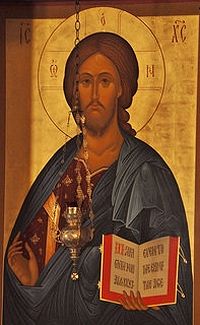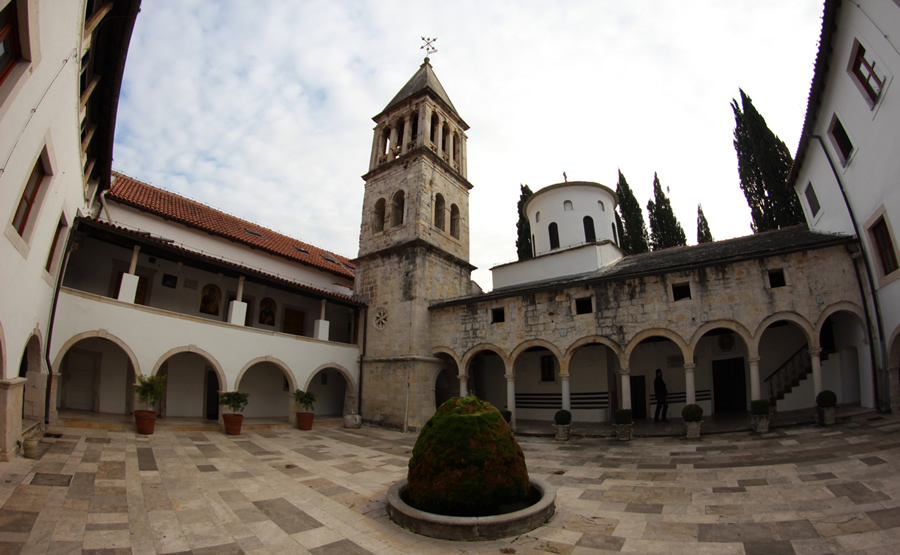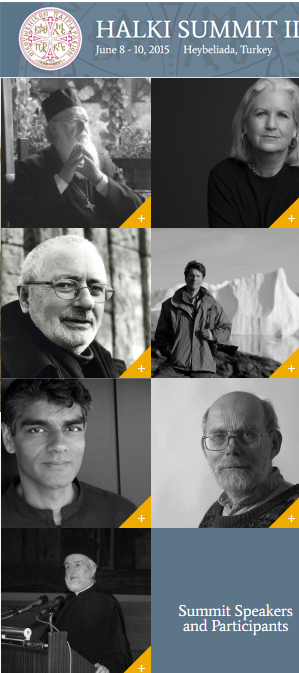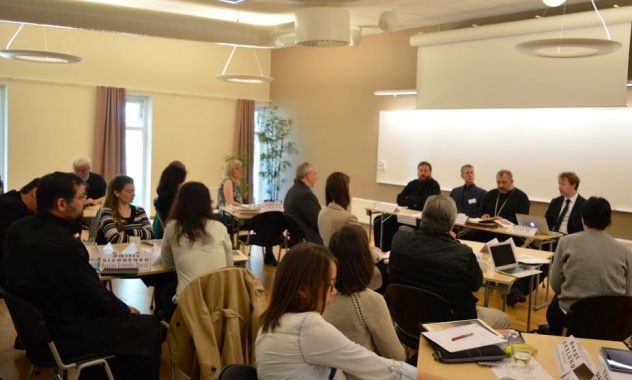Science
International Biblical Conference: "Christ of the Sacred Stories"
8. September 2015 - 12:33 Faculty of Orthodox Theology has a rare honour to inform the public that, from 10 till 13 September of this year, it will host a major international conference on the relevant topic of contemporary biblical theology, entitled:
Faculty of Orthodox Theology has a rare honour to inform the public that, from 10 till 13 September of this year, it will host a major international conference on the relevant topic of contemporary biblical theology, entitled:
The primary importance of this scholarly assembly is reflected through interactive considerations of Christ’s images in the sacred stories of biblical writers and ecclesial traditions, which in a rare manner suits the encountering of Eastern and Western exegetes in the city of everlasting encounter and under the vaults of the school of theology, which in itself comprehends both East and West.
Peacemaking In a Troubled World
27. August 2015 - 13:34 The Lord Jesus said: “I have said this to you, that in me you may have peace. In the world you have tribulation; but be of good cheer, I have overcome the world.” (John 16:33)
The Lord Jesus said: “I have said this to you, that in me you may have peace. In the world you have tribulation; but be of good cheer, I have overcome the world.” (John 16:33)
In the Orthodox Church liturgies, prayers for peace abound in the litanies. Additional the celebrant and congregants wish each other peace throughout the services. When the Gospel is proclaimed, peace is wished upon all those listening.
Yet, we know that peace in the world is elusive, even though Christ our Lord commands us to love even our enemies. We pray for and hope for and pursue peace with all, and yet we cannot determine how others will act towards us or towards each other. St. Gregory the Great, (d. 604AD) reflects on the difficulty of wishing to pursue peace in a world in which many are not interested in peace at all, nor are they influenced by or concerned about God. Are Christians only to be Good Samaritans and come in and help those who are suffering, or do Christians have any mandate to resist or prevent evil from occurring, even by the use of force?
The Theological Seminary of Zadar: On the occasion of its 400th anniversary (1615-2015)
17. August 2015 - 11:46 The theological seminary at the monastery Krka dates from the time of the Patriarch of Pec Pajsije Janjevac (1614-1647). Metropolitan Teodor of Dabar-Bosnia, as the exarch of all of Dalmatia, in 1615, ordered that a theological school be founded in the monastery Krka.
The theological seminary at the monastery Krka dates from the time of the Patriarch of Pec Pajsije Janjevac (1614-1647). Metropolitan Teodor of Dabar-Bosnia, as the exarch of all of Dalmatia, in 1615, ordered that a theological school be founded in the monastery Krka.
This historical role was given to the superior of Krka, Joakim, who “was very skilful and well educated… He energetically strived to have the younger Dalmatian priests” become better and more skilled in performing their pastoral duties. Yet, this wish to establish a theological seminary in the monastery Krka, was not accidental. Throughout its long history, this monastery was a transcribing center, a spiritual center and a place of gathering for the Serbs in Dalmatia. An Akathist was transcribed in the monastery Krka in 1557, and in 1597 as many as three liturgical-theological books were written: Akathist, Prayer-book and Prologue. In 1601, twelve Menaions were transcribed.
Eighty Years of Indo–Serbian Orthodox Relations & Saint Dositej Vasić of Zagreb
18. July 2015 - 10:31(Additional Note: In 2010 Metropolitan Gregorious Gabriel of Trivandrum of the Indian Orthodox Malanakra Church attended the Enthronement of the Serbian Patriarch His Holiness Irinej at the Patriarchate of Pec in the Serbian Province Kosovo. The Above displayed picture of the visit of His Holiness Geevarghse II to Serbia was presented a special gift to Patriarch Irinej. The gift was prepared by Orthodoxy Cognate PAGE. Apart from that Fr Dr K M George of India visited Patriarch Irinej a few years back. OCP Secretary George Alexander met with with His Eminence Metropolitan Porfirije of Zagreb-Ljubljana of the Serbian Orthodox Church at Thessaloniki in 2014. Hence three personalities of Indian Orthodox origin were able to renew the historic connection between two churches).
Introduction
Ecumenism was something novel in the Christian world a century ago. While every denomination was nesting in their doctrinal shell, Inter-Church relations was absurd. Politics, lack of communication and transport kept the Orthodox Churches away from interaction amid them. Perhaps except in the Holy city of Jerusalem, it was almost zilch till the middle of the twentieth century, where also the relation remained hostile most of the time.
Halki Summit II
15. June 2015 - 14:22 His All-Holiness Ecumenical Patriarch Bartholomew is hosting the second Halki Summit on “Theology, Ecology, and the Word.” Co-sponsored by Southern New Hampshire University, the summit will be held on the island of Halki from June 8-10, 2015.
His All-Holiness Ecumenical Patriarch Bartholomew is hosting the second Halki Summit on “Theology, Ecology, and the Word.” Co-sponsored by Southern New Hampshire University, the summit will be held on the island of Halki from June 8-10, 2015.
Continuing the legacy established by the Ecumenical Patriarchate for over twenty-five years, Halki Summit II follows a series of pioneering ecological initiatives, including eight international symposia (1995-2009) and five summer seminars (1994-1998).
Halki Summit I, “a conversation on environment, ethics and innovation,” was held in June 2012 and featured prominent speakers, such as environmentalists Jane Goodall and Bill McKibben, as well as scientists James Hansen and Amory Lovins.
Halki Summit II will draw distinguished literary and environmental leaders, including Terry Eagleton (literary theorist and critic) and Terry Tempest Williams (poet and author), as well as James Balog (mountaineer and photographer), Raj Patel (author and activist) and Timothy Gorringe (theologian and apiculturist), for an inspiring “conversation on the environment, literature and the arts.”
Ecumenical Patriarch Bartholomew will open the summit on June 8th, while Metropolitan John [Zizioulas] of Pergamon, the most prominent Orthodox spokesman on the environment, will deliver the keynote address.
Reversing climate change and restoring the depletion of the earth’s resources first and foremost require a change in values and beliefs in order for people to incorporate the ethical and spiritual dimensions of environmental sustainability into their lives and practices. Halki Summit II hopes to contribute toward this sacred vision and goal.
Source: Ecumenical Patriarchate
Russian Orthodox Church representative attends human rights seminar in Hagaberg
4. June 2015 - 12:58 A seminar organized by a mixed human rights working group of the Conference of European Church in cooperation with representatives of international organizations in Brussels took place on May 25-29, 2015, in the People’s University in Hagaberg, Sweden.
A seminar organized by a mixed human rights working group of the Conference of European Church in cooperation with representatives of international organizations in Brussels took place on May 25-29, 2015, in the People’s University in Hagaberg, Sweden.
The forum was attended by over 40 clergy, political and public figures and experts in human rights.





